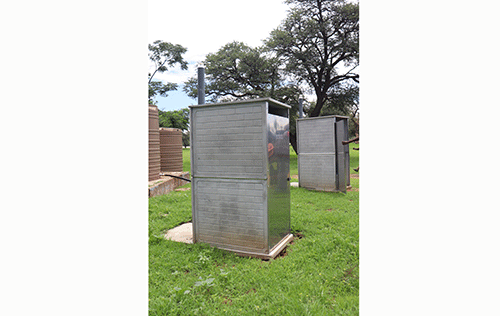Loide Jason & Rose-Mary Haufiku
Residents of Ongombo West, Dordabis and Stinkwater have applauded the Khomas Regional Council for rural sanitation and water provision.
Some residents New Era spoke to said in the past, they were relieving themselves in the bushes when nature calls, before the installation of the toilets.
Namibia has one of the lowest sanitation coverage rates in southern Africa, and at least half of all informal settlement residents defecate in the open.
Development Workshop (DW) Namibia, a non-governmental organisation, estimates that 122 200 residents don’t have toilets, and an estimated 61 tons of faeces are disposed of in open areas of informal settlements every day in the Khomas region.
Amanda //Hoebes from Ongombo West, where 20 toilets were constructed through the Khomas regional programme during 2019, 2020 and 2021, said she suffered in the past by walking a distance to the bushes when nature called.
“I am very old. I use to struggle a lot, especially at night, when nature called. It was not safe. There are snakes in the bush, and you can also meet with people with bad intentions, as you know rape cases are high in this area. I want to say I am very happy with what the council has done for us,” she said smiling.
Another resident, Christine Vries, said although only 20 toilets were constructed, the impact it brought to the community is high.
“People can now use the toilets, instead of the bushes. I also want to commend the council for installing boreholes. It helps us a lot. In the past, we never had enough water as the other two old boreholes were not giving sufficient water,” she stated.
The Khomas Regional Council took a familiarisation tour to see for themselves what was happening in terms of developing projects in different constituencies this week.
At Ongombo West, the regional council drilled six boreholes last year.
According to the council’s chairperson John Moonde, the visit to the projects was excellent and an eye-opener for the councillors.
“Next week, the council will review its strategic plan and come up with better strategies that we can employ with the meagre resources at our disposal to mitigate the challenges that we still face in the region,” he stated.
Moonde said despite having implemented these projects successfully, they as a regional government still face challenges to provide better services to communities.
Projects
The regional council has made budgetary provision to construct classrooms and ablution blocks, fencing, renovations of clinics, laboratories, business opportunities, expansion of Wifi and the purchasing of computers, rural sanitation and water provision.
Moonde said the construction of classrooms at various schools aims to address the shortage of classroom space in the region.
“The region is faced with a challenge of a lack of classroom spaces, particularly for Grades 1 and 8. Therefore, the ongoing construction of classrooms at various schools that we visited will create additional classroom space for more learners,” he explained.
The construction of ablution facilities provides access to toilets and proper washing stations for the learners, thereby helping to stop the spread of communicable diseases such as Covid-19 and Hepatitis E.
“In terms of a rural sanitation programme, the regional council constructed and completed 84 portable toilets in the Windhoek Rural constituency at a value of N$1.2 million. The construction of 74 more portable toilets at a value of N$1.3 million also commenced at the end of last year.
Before the construction of community and household toilets, the community had challenges in accessing sanitation and hygienic care. The community members had to defecate in the open. Hence, the rural sanitation programme made an impact by providing access to toilet facilities,” said Moonde.
With regards to the water intervention programme, the council drilled and installed boreholes for N$1.7 million at various localities in the Windhoek Rural constituency. Phase 4 of the water provision project in the same constituency also commenced last year. A budget of N$1.8 million was allocated for Phase 4.
“The drilling and installation of boreholes provided access to clean water for human and animal consumption as well as crop irrigation for community members,” the councillor noted.



